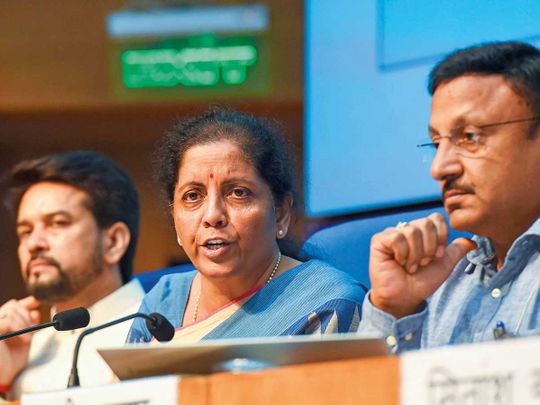
New Delhi: India rolled back an additional levy on foreign funds and announced other measures to boost economic growth.
The enhanced surcharge on long and short-term capital gains has been withdrawn, Finance Minister Nirmala Sitharaman said in New Delhi Friday. She also announced an immediate infusion of Rs700 billion (Dh35.77 billion, $9.8 billion) set aside in the budget last month to boost capital of banks.
“The enhanced surcharge on FPI goes, in simple words,” Sitharaman said, referring to a budget proposal pertaining to Foreign Portfolio Investors. “In other words, the pre-budget position is restored.”
The finance ministry had proposed increasing the effective tax rate on individuals with taxable annual income of above Rs20 million ($283,000) by about 3 per cent, and for those earning above Rs50 million by 7 per cent. Foreign Portfolio Investors became an unintended target of the move.
The tax proposal, along with a lack of measures to boost the economy in the July 5 budget, led to foreigners withdrawing more than $3 billion from Indian shares, putting pressure on stocks and the rupee.
Financial markets cheered the move to withdraw the levy, first shared by a government official earlier Friday. The S&P BSE Sensex, India’s key equity index, erased declines and closed 0.6 per cent higher. Rupee reversed losses to advance as much as 0.2 per cent.
The move to front-load capital injections for state-run banks will help spur fresh loans, she said, adding that banks will also pass on all rate cuts to borrowers. In order to improve transmission of central bank’s rate cuts, the minister announced lender will benchmark their loan products to the Reserve Bank of India’s benchmark rate.
These steps are key to achieving the goal of encouraging lending to allow companies to invest and boost growth.
Data due next week will probably show India’s gross domestic product expanded 5.6 per cent in the quarter ended June, slower than the 5.8 per cent pace seen in the previous three months.
Weakening growth numbers won’t come as a surprise. Consumer spending on everything from hair oil to cookies have waned as concerns about job losses grow, amid automobile makers shuttering factories temporarily to manage piling inventories. A shadow-banking crisis has also weighed on private consumption, which accounts for almost 60 per cent of the gross domestic product.












